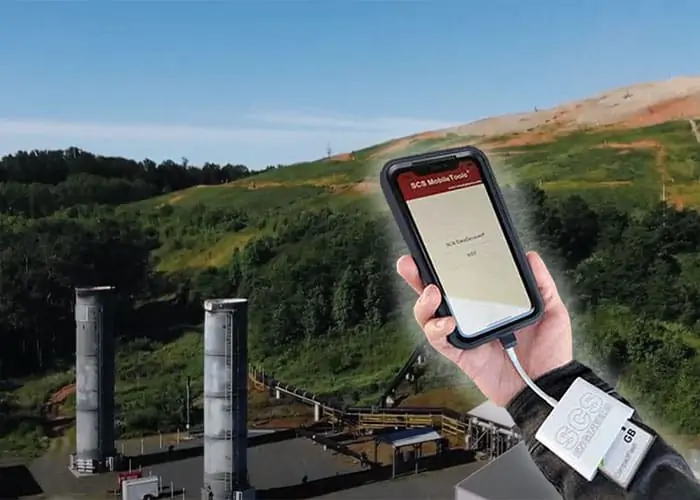


SCS Engineers announces its iOS and Android application SCS WDT™ for wireless data transfer of landfill flare readings to mobile devices. The app expands the power of SCS MobileTools® to observe system and environmental activity securely and in real-time.
Today’s landfill gas flares collect data using a Supervisory Control and Data Acquisition (SCADA) system. The flare’s SCADA system records data at preset intervals generating hundreds of thousands of readings to process and analyze. Often data is stored on a data card at the flare site. A technician collects the data by transcribing it into a log or digitally reading it, then transferring the reading to a computer. The data is then uploaded into the landfill’s database for analysis and reporting.
The process, with its multiple steps, is slow and open to human error. SCS WDT™ digitally collects flare readings directly into a mobile device and into SCS DataServices® in seconds, reducing human error and multiple steps. The app’s interface provides secure access to information that drives critical operating decisions and collects historical data for trends, corporate directives, and landfill gas OM&M programs.
Landfill managers and environmental engineers can monitor their flares in real-time, seeing exceedances immediately. SCS WDT™ uses GPS to capture the exact physical location of flares and place the data into the appropriate landfill’s site location too. Flare readings are available, literally in seconds, for review, analysis, and corrective action if needed. Pilot testing at 30 landfills nationwide demonstrates that SCS WDT™ saves time and errors by removing extra steps and people in the progression; there is no need to wait until the end of a technician’s shift to transfer readings or have extra hands in the process.
SCS DataServices®, a secure web-based landfill gas management application, is part of the SCSeTools® platform in use on hundreds of landfills backed by over 50 years of landfill design, operation, and maintenance experience. SCS Engineers understands how unique landfill operations are today, so SCS WDT™ works as a standalone app with other platforms and is free to SCSeTools® users. Download on the Apple App Store for iPhones and iPads, Google Play for Android.
The SCSeTools® platform and applications help facilities operate more efficiently by continually gauging operational health and spot trends that help determine when and how to invest in infrastructure. For additional information and demonstrations of these productivity-enhancing tools, please click here.
The EPA Resource Conservation and Recovery Act (RCRA) requires landfill operators to maintain post-closure care for 30 years, though states will adjust the term according to when they determine ending this care will not threaten human health or the environment. Industry stakeholders say it’s not enough guidance because it does not provide how states should assess for impact on human health or the environment, nor how to determine when to transition from active post-closure care to custodial care. Regulators tend to default to an extension of terms. Again data collection plays a significant role in determining the post-closure care term.
“The whole purpose of the post-closure care term is to provide enough time for landfills to become stable. One way to assess is by determining if functional stability has been achieved, which entails looking at performance metrics like leachate management, settlement, landfill gas control, and groundwater monitoring,” says Bob Gardner, of SCS Engineers.
Looking at these metrics, once it’s determined that functional stability has been achieved, these active systems may be able to be turned off, with only passive controls like cover remaining in place.
Monitoring may be done less frequently or not at all. “EPA acknowledges that back in the 1980s, it did not know how systems, primarily liner systems, would perform under new Subtitle D rules. But based on monitoring of these systems over the past 25 years, we know that they perform well to prevent migration of contaminants to groundwater,” says Gardner.
Read the Waste360 article Stakeholders Call for More Certain Landfill Post-closure Care Terms
Investigate why over 600 landfills use SCS eTools® to track, report, and store important data.

Not only do these technologies support facilities with their day-to-day operations, they have a positive impact on the market and on safety.
Read and share the article by clicking here.
SALT LAKE CITY, UT. – SCS Engineers recently announced the opening of a new office near Salt Lake City, expanding services to clients in the Western region of the U.S. The new office is located at:
SCS Engineers | SCS Field Services
1952 West Parkway Boulevard,
West Valley City, UT 84119
Tel: +1-801-849-2160
SCS continues to provide environmental engineering and consulting services to municipal and private sector clients, and has expanded the range of its SCS Field Services Division to provide clients in Nevada, Utah, Colorado, and Montana with a variety of landfill, landfill gas (LFG), and landfill gas to energy (LFGTE) services, including LFG collection and control system operations, monitoring, and maintenance services.
SCS also offers SCSeTools®, a platform for data management software used at landfills to improve operational safety, data collection, and analysis to meet the new EPA compliance rule. SCSeTools currently features SCS DataServices®, SCS Remote Monitoring and Control®, and SCS MobileToolsTM and is in use at over 600 landfills nationwide. The unique combination of high-level technical engineering services with practical, hands-on operations expertise, including compliance data management is not typically available from other environmental engineering firms.
“Our intent is to continuously expand our support to clients in these states,” said Galen Petoyan, Senior Vice President of SCS Field Services OM&M Division. “We continue to use highly-skilled professionals with plenty of field experience, and our ability to analyze a landfill’s data has helped us become even more dependable and cost-effective on closed and active landfills.”